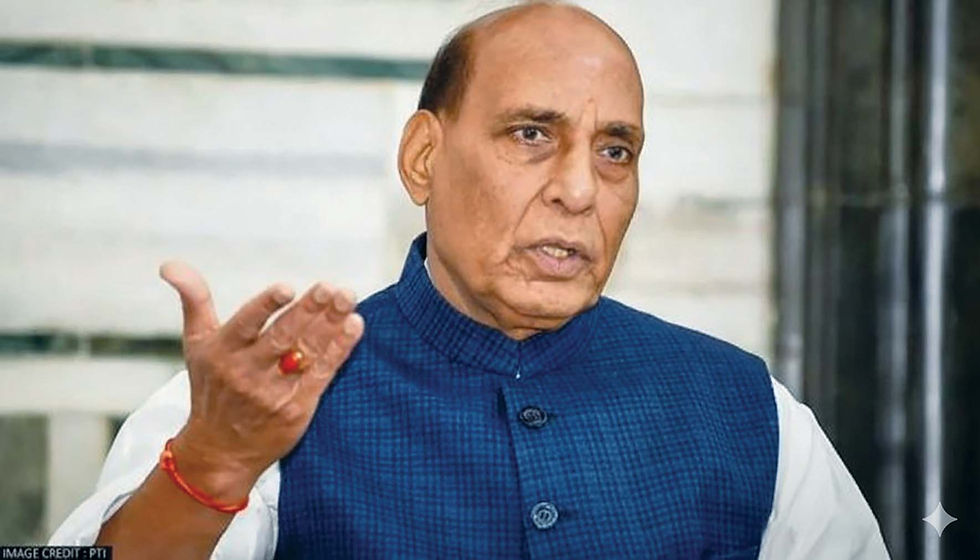The Global Reverberations of Pahalgam
- Commodore S.L. Deshmukh

- May 26
- 4 min read
The Pahalgam massacre was a geopolitical earthquake that exposed Pakistan, shook the region, and reshaped India’s security doctrine.

On April 22, the stillness of the Himalayan Spring was shattered in the picturesque town of Pahalgam, in South Kashmir’s Anantnag district. What ought to have been an unremarkable day in a region trying to rebuild its tourism-dependent economy turned into a bloodbath. In a chilling act of premeditated savagery, more than 25 Hindu tourists were slaughtered by terrorists belonging to The Resistance Front (TRF), a known proxy of the Pakistan-backed Lashkar-e-Taiba (LeT).
This was a strategic assault designed to inflame India’s religious divide, provoke a disproportionate reaction and fracture the fragile sense of normalcy that had gradually returned to Kashmir. The terrorists had struck at the softest of targets to send the loudest of messages: that no part of Kashmir is safe, and that the shadow of cross-border jihad remains long and enduring. The assault was a carefully engineered provocation, meant to paint India’s muscular response as majoritarian vengeance and thereby deepen the Hindu-Muslim faultline that Pakistan has long exploited.
But as India launched Operation Sindoor, it did not take this bait. The public was outraged, no doubt, yet the government chose not fury but ferocity in form of measured, precise and devastating strikes against terror camps in Pakistan-occupied Kashmir and deep within Pakistan, deploying armed drones, precision-guided munitions and electronic warfare.
Operation Sindoor was no ordinary response. It marked a turning point in India’s counter-terror doctrine. The era of ‘strategic restraint,’ once held up as a virtue of mature statecraft now looks like a relic. India’s use of stand-off weapons, its effective coordination among the tri-services, and its hardened air defence posturing left no doubt that New Delhi was done playing by the old playbook. What rattled Pakistan was not just the damage inflicted but the message encoded that India was ready to punish terror at source without playing to the global gallery.
The diplomatic fallout in the aftermath of Pahalgam has been immediate. India downgraded ties with Islamabad, expelled Pakistani officials, suspended visas and closed the Attari-Wagah border. More crushingly for Pakistan, it announced the suspension of the Indus Waters Treaty, a move that targeted one of the few remaining strands of bilateral cooperation and which remains in abeyance even after the Sindoor strikes.
Pakistan, as is customary, has denied complicity in the Pahalgam massacre. It called India’s retaliation ‘diversionary’ and accused it of ‘warmongering.’ But its next move after the Pahalgam attack had only reinforced New Delhi’s case when instead of de-escalating, Islamabad, in a wrong step, mobilised its military. With that gesture, Pakistan confirmed what many in global capitals had long suspected - that its civilian leadership remains subservient to a military-jihadi complex that sees peace with India as an existential threat.
The consequences have rippled far beyond Kashmir. Regionally, the attack has pushed South Asia further into strategic disarray. Kashmir’s tourism sector, one of the few economic bright spots in the troubled valley, has nosedived. Indian and foreign travellers are wary, spooked by images of carnage in a land once sold as paradise. Flights have been rerouted, commercial traffic disrupted, and trade corridors frozen. Pakistan’s closure of air routes has impeded not just Indian commerce but its own economic recovery.
Multilateral initiatives have suffered too. SAARC, South Asia’s perpetually dormant regional grouping, now stares at formal obsolescence. The idea of economic integration, already weak, has collapsed under the weight of renewed mistrust. Worse, the attack has provided a fresh rallying cry for global jihadist networks. Al-Qaeda in the Indian Subcontinent (AQIS), which has long used Pakistan as an incubator, has seized on India’s counter-terror operations to fan the flames of anti-India rhetoric, raising the spectre of regional instability.
Western governments, who keep viewing India-Pakistan tensions through the lens of a false moral equivalence, have been jolted out of their complacency. The Pahalgam attack made one thing clear: the threat of cross-border terrorism is neither dormant nor distant. It remains active, potent and state-enabled. And it is now global. Beijing watched closely, knowing that any escalation could pull it into a broader South Asian conflagration. Washington issued carefully worded condemnations but refrained from offering mediation, a tacit acknowledgment that Pakistan’s credibility is in tatters.
The Indian government now sees diplomacy with Pakistan as a trap unless underpinned by enforceable accountability. Dialogue is not a panacea; it is a privilege that Islamabad must earn. The freeze in ties is not just a timeout, but a test.
If Pakistan continues to allow groups like TRF and LeT to operate with impunity, the subcontinent will remain perpetually on edge. There is a final lesson for the international community. For all its sermonising on human rights and due process, the West has turned a blind eye to Pakistan’s decades-long use of terrorism as foreign policy. In doing so, it has failed not only India but the cause of regional stability. As Dwight Eisenhower once warned, “The world must learn to work together, or finally it will not work at all.” That time may soon run out.
(The writer is a retired Naval Aviation Officer and defence analyst. Views personal.)





Elaborate summary with factual analysis gives us indepth story bwhind the curtain.
Challege ahead before Indian Govt and Omar administration is to put tourism on track.
India needs to have out of box strategy to prevent Kashmiris from helplessly supporting cross border terrorists.
Rest of the India must realise, how divisive tactics in vote bank politics may destroy internal peacepeace and materiastic progress of everbody.
Efforts to midernise and strngthen warfare apparatuses ahead of any technology in world must be on fastest track.
External affairs need challenging tight rope walk to prevent US to rebuild Pakistan as Buffer state with consolidating close friendship with Russia.
Pahalgam incident has given us opportunity to recallibrate our External affairs, Internal peace strategy an…